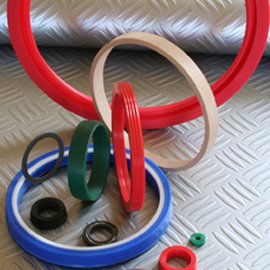Single vs double acting piston seals
Posted on 24/02/2017 Category: Seals

Piston seals are used to create a seal between the piston and the cylinder bore, preventing leakage of hydraulic fluid or air. This seal is internal to the cylinder and allows pressure to be maintained on one side of the piston, creating the force to move it back and forth. In this blog, Martin’s Rubber Company explains the function and advantages of single and double acting piston seals.
How does a piston seal work?
A piston seal works by containing pressure on one side of a piston without leakage. This allows maximum mechanical effort to be applied to moving the piston along the bore of a cylinder. A piston seal can be driven either hydraulically or pneumatically, with an appropriate piston seal design for each system and application.
Piston seals are intended to prevent leakage past the piston and therefore maximise the efficiency of a system. Pressure can either be applied in one direction only (single acting) or from either direction (double acting) to drive the ram to which the piston is fixed both in and out.
Single acting piston seals
Single acting piston seals contain pressure on one side of a piston without leakage. This allows maximum effort to be applied to moving the piston along the bore of a cylinder. Single acting piston seals only contain pressure on one side of the piston. The seal is required to retain pressure from that direction, which then moves the piston along the cylinder in a ‘single action’ – hence the name.
It is worth noting that the piston in single-acting cylinders may have oil on the pressure side only, with the opposite sidefilled with air. Therefore, piston seals should leave a minimum of oil film when passing along the cylinder bore. The transportation of oil would otherwise result in a leakage. The air side of single acting cylinders may also push air out and draw air in as the piston reciprocates. This air may carry moisture and contaminants into the cylinder, which can also lead to seal damage.
Double acting piston seals
Double acting piston seals contain pressure on both sides of a piston, which is applied from either direction. This drives the ram that the piston is fixed to both in and out or stops it in a controlled position. They have a symmetrical cross section and identical sealing functions in both directions. Double acting piston seals normally consist of a slide ring and an energiser. The deformation of the elastomeric energiser provides enough force to keep the slide ring in dynamic sealing contact with the cylinder bore, while also sealing statically against the seal housing groove.
In the case of a double acting cylinder, a relatively thick lubrication film can be permitted between the piston seal and the cylinder bore to minimise friction and wear. However, the transportation of fluid occurring during dynamic operation is relatively insignificant in most applications.
Piston seal design and materials
The chosen piston seal material influences the choice of seal profile. Depending on the profile and the required characteristics, a piston seal can consist of one or several materials. Common piston seal materials include nitrile rubber (NBR), thermoplastic polyurethane (H-PU), acetal, Viton, EPDM and polytetrafluorethylene (PTFE). When determining the best seal design and material for a particular application, consideration also needs to be given to the pressures expected, as well as considering the acceptable friction losses and whether the piston head is integral or split.
Given the different functions of single and double acting seals, it is important to specify which seal type you require. Our single acting piston seals can be CNC machined to bespoke sizes. We can add material to compensate for worn or re-manufactured piston or cylinder conditions. Plus, we can help to restore the original performance of used equipment, as well as provide components for new build designs. View our standard profiles for general guidance or, better still, why not speak to one of our friendly and knowledgeable advisers for some professional guidance to get the most appropriate single or double acting piston seal for your application.
Find out more about our standard and bespoke Single and Double Acting Piston Seals, please call Martin’s Rubber Company today on 023 8022 6330 or email [email protected].
The post Single vs double acting piston seals appeared first on Martin’s Rubber Company.


